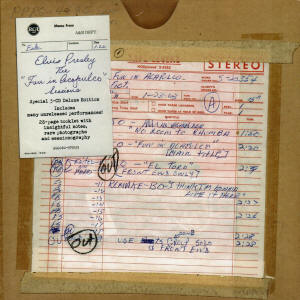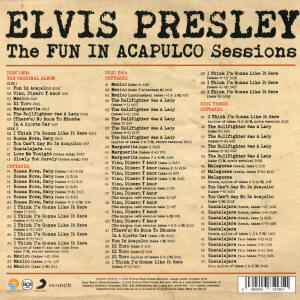(C) Follow That Dream Records / Sony Music Entertainment
The ultimate site about the king of the analogue age


The song by Ben Weisman and Sid Wayne describes an idealized vacation scenery and its melody creates a nice holiday mood. Elvis recorded the tune on January 23, 1963. The first attempt became the master.
Vino, Dinero Y AmorWith this uptempo tune Elvis sings about the good things in life. "Vino, Dinero Y Amor" was written by Sid Tepper and Roy C. Bennett and recorded by Elvis on January 22, 1963 within five takes.
MexicoThis one also spreads southern vitality and is performed by Elvis with zest. On January 22nd he recorded seven takes of this latin tune and finally approved the fifth one for release. Once again the writers are Sid Tepper and Roy C. Bennett. In Germany RCA Victor released "Mexico" and "You Can't Say No In Acapulco" on a single and provided Elvis with another top 30 hit.
El TorroBecause he cannot get over the defeat by El Torro, the matador enters the arena at night to take revenge. Once again the bull wins, but this time he takes the life of the proud Spaniard. The song was written by Bill Giant, Bernie Baum and Florence Kaye and is performed by Elvis with the commanded drama. The master is a splice of the takes 2 and 1.
MargueritaDon Robertson had written some beautiful ballads for Elvis in the past and "Marguerita" is no exception. In dramatic southern style the singer praizes the love of the said lady and the king really lives up to the task. To me this song is one of the highlights of this album. "Marguerita" was recorded on January 22, 1963, take 8 was chosen for release.
The Bullfighter Was A LadyAnother song about a bullfight, but this time with a touch of comedy. The bull falls in love with the female matador and gets killed because of his sudden softness. The fluffy movie tune was penned by Sid Tepper and Roy C. Bennet and recorded on January 22, 1963. The master is a splice of the takes 9 and 7.
(There Is) No Room To Rumba In A Sports CarThe lyrics are about the impossibility to move accordantly in a tiny sports car and musically the song by Fred Wise and Dick Manning doesn't convince by sophistication, too. On January 23, 1963 Elvis recorded a single take of "(There Is) No Room To Rumba In A Sports Car" and moved on.
I Think I'm Gonna Like It HereMexico is described as a peaceful place full of beautiful girls and without any worry. The music emphasizes the lyrics and Elvis obviously likes the tune. It was recorded on January 22, 1963, the master is a splice of the takes 10 and 7. "I Think I'm Gonna Like It Here" was written by Hal Blair and Don Robertson.
Bossa Nova BabyThis song was written by Jerry Leiber and Mike Stoller and recorded by Tippie & The Clovers in 1962. Musically the bossa nova is located in Brazil instead of Mexico, but who cares about geograpy in a Presley movie? The king recorded "Bossa Nova Baby" on January 22, 1963 and selected take 11 for release. To promote the album RCA Victor had released the song on a single with "Witchcraft" in October and provided the king with another top 10 hit. In 1970 the song could also be found on the boxed set "Worldwide 50 Gold Award Hits - Volume 1".
You Can't Say No In AcapulcoThe singer wants to seduce a lady with this song and uses the argument that one simply cannot say no in Acapulco. If life was that easy! The tune by Dick Feller, Dolores Fuller and Lee Morris is lightweight in any way, I regard it to be well produced elevator music. Elvis recorded the song on January 23, 1963 within 5 takes.
GuadalajaraThis song is in Spanish language and was written and recorded by Pepe Guisar in 1936. The music track was recorded on January 23rd, the vocal track followed on February 27th. Neither the band, nor Elvis managed to produce a complete, releasable track. The music was a splice of the takes 1 and 7, the vocal was a splice of the takes 6 and 2. In 1972 CAMDEN used "Guadalajara" on the budget album "Burning Love And Hits From His Movies".
Love Me TonightElvis recorded the ballad on May 26, 1963 at RCA Studio B in Nashville/Tennessee for an album, that later would be canceled in favor of the greatest hits compilation "Elvis' Golden Records - Volume 3" and this soundtrack lp. As the title suggests, a lady is to be seduced. In contrast to most of the ballads the king recorded in the early 1960s he doesn't croon and sing in his higher register, but uses his voice to the full extend and sings comparably low. The writer of this very good love song is Don Robertson.
Slowly But SurelyThe album closes with a popsong in midtempo by Sid Wayne and Ben Wisman. Elvis recorded it on May 27, 1963 within five takes. Two years after the release on the "Fun In Acapulco" album the track was used by Allied Artists in the movie "Tickle Me" and re-released by RCA Victor on the accordant soundtrack ep.
Bossa Nova Baby (takes 1-11)The recording session starts with "Bossa Nova Baby". Take 1 is quite short, because Elvis misses his cue and doesn't start to sing. The second try is successfull and the group manages to come up with a complete performance. Of course everything still sounds a bit rough. The king knows, that this take won't be released anyway and jokingly turns "drink, drink, drink" into "drink, you fink". The producer announces the next take number, which starts with "BO". Elvis picks it up and sings it to the melody of the Italian popsong "IO". Later he would record the tune himself, albeit with English lyrics and entitled "Ask Me". Take 3 is another complete rendition, once again with the line "drink, you fink". The following attempt is just a false start, but the 5th take is another complete performance. It's quite noticable, that Elvis now sounds much more sure about the phrasing. Considering that he now might be capable of producing a master, the king leaves out his joke and sings "drink, drink, drink". During the fade-out he can be heared saying "Oh shit". Now the group tries out a slower tempo, but Elvis looses his step and cancels the take. The following two takes are complete performances, albeit the 9th one is ended rather abruptly. Elvis can be heared saying "Whatever it is, it is gone". I guess he's referring to the tempo, because now it is raised again. After another false start (take 10) the king and his crew deliver the master.
I Think I'm Gonna Like It Here (takes 1-9 & spliced master)The first take is a complete performance. Compared to the released version the tempo is slower and Elvis sings in a lower register. For a short while he gets lost in the lyrics and simply sings "I don't know". Take 2 is a false start, because the choir messes up the intro. The 3rd try is killed by Elvis himself, number four doesn't last long, because the singer has a lump in his throat. Mistakenly the producer once again announces take 4. Of course that doesn't have any impact on the performance, which is a complete one and sounds quite good. Elvis obviously thinks the same and suggests "Let's hear it back". Take number 6 (correctly announced) is a short false start. The producer doesn't want to stop the tape and says "We're still rolling". The musicians start again and produce another complete rendition. After a short while the producer stops take 8, whereupon Elvis changes the lyrics and sings "I know our chance for romance is always...quit". He asks "What happened?" and adds "It's beginning to BO". Here he is referring to the matrix numbers (which start with "BO") and the abbreviation for body odor. Take number 9 is cut short because the king has to laugh. Instead of take 10 we now get to hear the master, which is this very take with a single line of take 7 edited in. I am pretty sure they used the original tape for the edit and the undoctored take was destroyed.
Mexico (takes 1-5)After a few seconds Elvis stumbles upon the timing, but continues to sing. However, after another serious glitch the recording is stopped. Take 2 works well and is a complete performance. During the 3rd attempt the king looses his step and sings "Life begins when you're in...shit". The next try also is an unsuccessful one, because once again the lead vocalist gets distracted. However, he knows that he's on the right track and says "Almost". He certainly is right, because take number 5 isn't just a complete one, but would also be selected for release. At this point Elvis didn't know it yet and tried again. These takes can be heared on compact disc number 2.
(C) Follow That Dream Records / Sony Music Entertainment